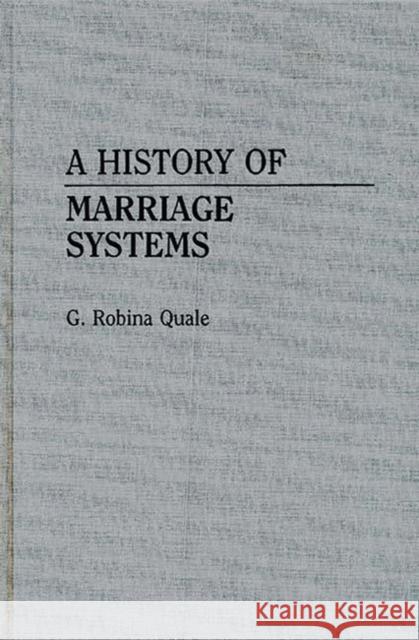A History of Marriage Systems » książka
A History of Marriage Systems
ISBN-13: 9780313260100 / Angielski / Twarda / 1988 / 415 str.
Readers seeking a historical and cross-cultural treatment of marriage and the family will not be disappointed by this book. A readable and comprehensive account of marriage, rich in colorful social history, Quale's work excels in the comparison of lines of development among the foremost cultures of the world. Particularly impressive in this regard is her treatment of the Eastern civilizations and how these differed from what demographic historians have come to call the West European pattern' of marriage....Although written as a history, this book should be of interest to students of the family in the social sciences. While it is not a path-breaking work in the sense of providing significant novel conceptual or theoretical insights, it skillfully incorporates theoretical and empirical contributions from a multitude of disciplines. It devotes considerable attention to contemporary trends and consistently relates the institution of the family to the overall socioeconomic, political, and demographic contingencies within society....Quale has written an important book that contains a wealth of useful informaton and deserves serious consideration for use in graduate and undergraduate instruction.
"Journal of Marriage and the Family"
This is the first general worldwide history of marriage systems. Though it is comprehensive, it also uses contemporary American trends to illustrate broader tendencies in significant and sometimes dramatic ways. After going back to the earliest generations of human life to seek the roots of why and how human beings came to marry, it explores the various points in family life at which marriages are made, dissolved, and remade. It treats marriage systems as a basis for understanding how not only families, but whole societies operate. The functioning of a marriage system is perceived to be fully related to the overall economic and political situation within which families and individuals must make their way. The overall situation is looked at in a historical context, reflecting a condition of constant change. Quale traces the gradual modifications in patterns through the rise of agriculture and herding into commercial-urban societies and on to contemporary industrial-commercial life, comparing lines of development in the major regions of the world.











